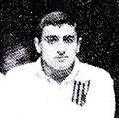Julius Hirsch
 | |||
| Personal information | |||
|---|---|---|---|
| Date of birth | 7 April 1892 | ||
| Place of birth | Achern, Germany | ||
| Date of death | declared dead 8 May 1945 | ||
| Place of death | Auschwitz, Poland | ||
| Playing position | Left Winger | ||
| Youth career | |||
| 1902-1909 | Karlsruher FV | ||
| Senior career* | |||
| Years | Team | Apps† | (Gls)† |
| 1909-1913 | Karlsruher FV | ||
| 1913-1919 | SpVgg Fürth | ||
| 1919-1925 | Karlsruher FV | ||
| National team | |||
| 1911-1913 | Germany | 7 | (4) |
| * Senior club appearances and goals counted for the domestic league only. † Appearances (Goals). | |||
Julius Hirsch (7 April 1892 – declared dead 8 May 1945) was a German international footballer who was killed during the Holocaust.[1][2] He helped Karlsruher FV to win the 1910 German championship.
Hirsch was the seventh child of a Jewish merchant, and joined Karlsruher FV at the age of ten. By the age of 19 he represented Germany internationally. Together with Fritz Förderer and Gottfried Fuchs he formed an attacking trio. Nicknamed "Juller" he was best known for his attacking style and his hard shot. After joining SpVgg Fürth in 1913 and winning another German championship the following year, with his new club. He returned to KFV after the war and retired in 1923. However. he remained with the club as a youth coach.[3]
Reading in a newspaper on 10 April 1933 that all Southern German clubs would ban Jewish members, he left KFV by his own choice after over 30 years as a member. In a letter to his club he requested that it should not be forgotten that, even though Jews were now the whipping boys of the nation, many of them had given their life blood for the German nation and were true patriots, as shown by their deeds and words.[3]
He was deported to Auschwitz concentration camp on 1 March 1943. His exact date of death is unknown. In 1950, a German court declared him dead with the date of death set on 8 May 1945.[4]
Hirsch was the first Jewish player to represent the German national team. Hirsch had served for four years in the German Army in World War I, and had been decorated with the Iron Cross.[5] His brother Leopold died in action in 1916, also serving in the German Army.[3]
Since 2005 the German Football Federation awards the "Julius-Hirsch-Preis" for outstanding examples of integration and tolerance within German football.[6]
Footnotes
- ↑ Bell, Jack (20 September 2005). "German Federation Admits to Nazi Past". The New York Times. Retrieved 2007-10-08.
- ↑ Schaffer, Kay; Smith, Sidonie (2000). The Olympics at the Millennium: Power, Politics, and the Games. Rutgers University Press. pp. 60–62. ISBN 978-0-8135-2820-5.
- ↑ 3.0 3.1 3.2 Deutscher Meister, Nationalspieler, Olympionike (German) DFB website. Retrieved 25 June 2012
- ↑ "Hirsch, Julius". Jews in Sports. Retrieved 27 March 2009.
- ↑ Nationalspieler und Opfer des Nationalsozialismus (German) Der Westen, Published: 7 April 2008. Retrieved 13 July 2009
- ↑ Ein Zeichen gegen Diskriminierung (German) DFB website. Retrieved 25 June 2012
External links
- Profile at Weltfussball.de (German)
- Pictures at Karlsruher-fv1891.de (German)
|